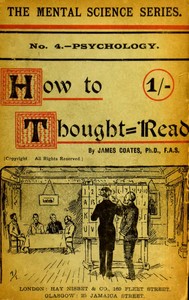How to thought-read : A manual of instruction in the strange and mystic in…
"How to Thought-Read" by F.A.S. Ph.D. James Coates is a manual of instruction on psychic phenomena written in the late 19th century. The book explores a range of topics related to mental science, such as hypnotism, thought transference, clairvoyance, and psychometry, aiming to provide practical insights and techniques for readers interested in developing psychic skills. The opening of the text introduces the author’s intention to elucidate various states of consciousness, particularly focusing
on somnambulism, hypnosis, and their relation to thought-reading. Coates explains the factors that influence the manifestation of mental abilities, laying the groundwork for understanding psychic phenomena as a bridge between physical and spiritual dimensions. He suggests that heightened awareness and control over one's psychic abilities could unravel the complex relationship between mind and soul, providing an exciting perspective for readers curious about the uncharted territories of human consciousness. (This is an automatically generated summary.)
Read or download for free
| Reading Options | Url | Size | |||
|---|---|---|---|---|---|
| Read now! | https://www.gutenberg.org/ebooks/68388.html.images | 269 kB | |||
| EPUB3 (E-readers incl. Send-to-Kindle) | https://www.gutenberg.org/ebooks/68388.epub3.images | 1.1 MB | |||
| EPUB (older E-readers) | https://www.gutenberg.org/ebooks/68388.epub.images | 1.1 MB | |||
| EPUB (no images, older E-readers) | https://www.gutenberg.org/ebooks/68388.epub.noimages | 282 kB | |||
| Kindle | https://www.gutenberg.org/ebooks/68388.kf8.images | 1.6 MB | |||
| older Kindles | https://www.gutenberg.org/ebooks/68388.kindle.images | 1.6 MB | |||
| Plain Text UTF-8 | https://www.gutenberg.org/ebooks/68388.txt.utf-8 | 242 kB | |||
| Download HTML (zip) | https://www.gutenberg.org/cache/epub/68388/pg68388-h.zip | 1.7 MB | |||
| There may be more files related to this item. | |||||
Similar Books
About this eBook
| Author | Coates, James, 1843-1933 |
|---|---|
| Title | How to thought-read : A manual of instruction in the strange and mystic in daily life, psychic phenomena, including hypnotic, mesmeric, and psychic states, mind and muscle reading, thought transference, psychometry, clairvoyance, and phenomenal spiritualism |
| Original Publication | United Kingdom: Hay Nisbet & Co.,1893. |
| Credits | deaurider and the Online Distributed Proofreading Team at www.pgdp.net (This file was produced from images generously made available by The Internet Archive) |
| Reading Level | Reading ease score: 59.0 (10th to 12th grade). Somewhat difficult to read. |
| Language | English |
| LoC Class | BF: Philosophy, Psychology, Religion: Psychology, Philosophy, Psychoanalysis |
| Subject | Spiritualism |
| Subject | Clairvoyance |
| Subject | Telepathy |
| Category | Text |
| EBook-No. | 68388 |
| Release Date | Jun 23, 2022 |
| Most Recently Updated | Oct 18, 2024 |
| Copyright Status | Public domain in the USA. |
| Downloads | 562 downloads in the last 30 days. |
| Project Gutenberg eBooks are always free! | |

